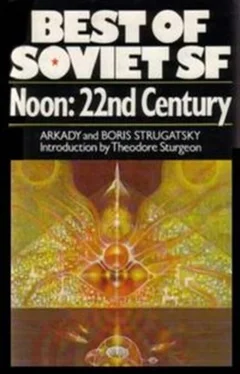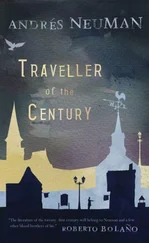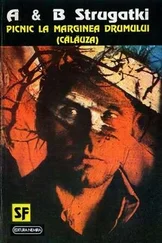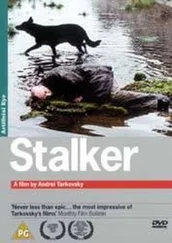“Shoot!” yelled Fokin.
He was already dashing down the street, stumbling at every fifth step. Mboga stood motionless, with his carbine lowered, and, craning his neck, watched the bird. It made an even, noiseless circle over the city, gaining altitude, and flew off to the south. In a moment it had disappeared. Then Komov saw more birds flying very low over the base—three, four, five—five enormous white birds shot upward over the cybers’ workplace, and disappeared.
Komov got down from the roof. The dead parallelepipeds of the buildings threw dense black shadows onto the grass. The grass looked silver. Something jingled underfoot. Komov bent over. A cartridge-case gleamed in the grass. Komov crossed over the distorted shadow of the helicopter, and heard voices. Mboga, Fokin, Ryu, and Tanya were walking unhurriedly toward him.
“I had him in my hands!” Fokin said excitedly. “But he knocked me on the head and tore away. If he hadn’t slugged me, I never would have let him go! He was soft and warm, like a child. And naked.”
“We almost caught him too,” said Tanya. “But he turned into a bird and flew away.”
“Come now!” scoffed Fokin. “Turned into a bird…”
“No, really,” Ryu insisted. “He rounded the corner, and right away a bird flew up.”
“So?” said Fokin. “He flushed a bird, and you stood there with your mouths gaping.”
“A coincidence,” said Mboga.
Komov went up to them, and they stopped.
“What exactly happened?” asked Komov.
“I had caught him,” declared Fokin, “but he knocked me over the head.”
“I heard that,” said Komov. “How did it all start?”
“I was sitting on the packs, in ambush,” said Mboga. “I saw someone creeping through the grass right in the middle of the street. I wanted to catch him, and I moved toward him, but he saw me and turned back. I saw I couldn’t catch him, and fired into the air. I’m very sorry, Gennady, but I think I frightened them off.”
Silence reigned. Then Fokin asked doubtfully, “Exactly why are you sorry, Doctor Mboga?”
Mboga did not answer at once. Everyone waited. “There were at least two of them,” he finally said. “I discovered one, and the other was in the tent with you. But when I ran past the helicopter… well, look for yourselves,” he concluded unexpectedly. “You’ll have to examine it. Probably I’m wrong.” Silently Mboga started walking toward the camp. The others, exchanging glances, moved after him. Mboga stopped near the building on which the helicopter was sitting. “Somewhere around here,” he said.
Fokin and Tanya quickly crawled into the dark shadow under the wall. Ryu and Komov looked down expectantly at Mboga. He was thinking.
“There’s nothing here,” Fokin snapped.
“Just what did I see?” muttered Mboga. “Just what did I see?”
Fokin, irritated, moved away from the wall. The black shadow of the rotor vane crept across his face.
“Aha!” Mboga said loudly. “A strange shadow!”
He threw down the carbine and with a running jump he leapt onto the wall. “Please!” he said from the roof.
On the roof, beyond the helicopter fuselage, as if in a shop window, the things were neatly arranged-the butter, pack number E-9, the shoes, a neatly folded sheet, a pocket microelectrometer in a plastic case, four neutron batteries, a ball of dried vitriplast, and a pair of sunglasses.
“Here are my shoes,” said Tanya. “And my sunglasses. I dropped them into the river yesterday.”
“Ye-es,” Fokin said, and looked around carefully.
Komov seemed to come to himself. “Ryu!” he quickly shouted. “I have to get hold of the Sunflower immediately. Fokin, Tanya, make a photograph of this display! I’ll be back in half an hour.”
He jumped off the roof and started walking quickly, then broke into a run, heading down the street toward the base. Ryu followed him without saying anything.
“What’s going on?” yelled Fokin.
Mboga squatted down, got out his small pipe, puffed at it unhurriedly, and said, “They’re people, Boris. Even animals can steal things, but only people can bring back what they have stolen.”
Fokin moved back and sat on the wheel of the helicopter.
Komov returned alone. He seemed very excited, and in a high-pitched metallic voice he ordered them to break camp immediately. Fokin started showering him with questions. He demanded explanations. Then Komov recited in the same metallic voice: “By order of the captain of the starship Sunflower : Within three hours the meteorological base and laboratory, and the archeological camp will be dismantled; all cybernetic systems will be shut down; and all personnel, including Atmosphere Physicist Waseda, will return on board the Sunflower .” Fokin submitted out of sheer surprise and set to work with unusual diligence.
In two hours the helicopter made eight trips, and the cargo robots trampled down a broad road through the grass from the base to the boat. Of the base, only empty construction sites remained—all three systems of construction robots had been herded inside the storehouse and completely deprogrammed.
At six o’clock in the morning local time, when the east had begun to glow with the green dawn, the exhausted humans gathered by the boat, and here, at last, Fokin lost patience.
“Well, all right,” he began in an irate hoarse whisper. “You relayed us orders, Gennady, and we have carried them out honestly. But I would like to find out at last how come we’re leaving here! Why?” he yelped suddenly in a falsetto, picturesquely throwing up his hands. Everyone jumped, and Mboga dropped the pipe from his teeth. “Why? We look for Brothers in Reason for three hundred years, and run off with our tails between our legs as soon as we’ve discovered them? The best minds of humanity—”
“Good grief,” said Tanya, and Fokin shut up.
“I don’t understand a thing,” he said then in a hoarse whisper.
“Do you think, Boris, that we are capable of representing the best minds of humanity?” asked Mboga.
Komov muttered gloomily, “We’ve sure messed things up here! We burned out a whole field, trampled crops, shot guns. And around the base!” He waved his hand.
“But how could we know?” Ryu said guiltily.
“Yes,” said Mboga. “We made many mistakes. But I hope they’ve understood us. They’re civilized enough for that.”
“What sort of a civilization is this!” said Fokin. “Where are the machines? Where are the tools? Where are the cities?”
“Shut up, Boris,” said Komov. “‘Machines, cities’—just open your eyes! Do we know how to fly on birds? Have we bred animals that produce honey? Has our last mosquito been long exterminated? ‘Machines.’…”
“A biological civilization,” said Mboga.
“What?” asked Fokin.
“A biological civilization. Not machines, but selection, genetics, animal training. Who knows what forces they’ve mastered? And who can say whose civilization is superior?”
“Imagine, Boris,” said Tanya,
Fokin twirled his mustache furiously.
“And we’re clearing out,” said Komov, “because none of us has the right to take upon himself the responsibility of first contact.” Oh, am I sorry to leave! he thought. I don’t want to go—I want to search them out, to meet them, to talk, to see what they’re like. Can this really have happened at last? Not some brainless lizards, not some sort of leeches, but a real human race. A whole world, a whole history… Did you have wars and revolutions? Which did you get first, steam or electricity? And what is the meaning of life? And might I perhaps have something to read? The first essay in the comparative history of intelligent species. And we have to go. Oh boy, oh boy, do I ever feel like staying! But on Earth there has already for fifty years been a Commission on Contacts, which for all those years has been studying the comparative psychology of fish and ants, and arguing over in what language to say the first “uh.” Only now you can’t laugh at them any more. I wonder whether any of them had foreseen the possibility of a biological civilization. Probably. What haven’t they foreseen?
Читать дальше












